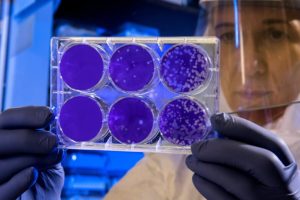Study Life Science in Canada

Study Life Science in Canada
Life Science studies the life of all living beings and organisms in the world. Recently, study programs in this sphere became widely popular among international students. Many of them choose to study Life Science in Canada.
Overview of the Programs
Schools in Canada offer courses in Life Science in three levels: undergraduate, graduate, and postgraduate. If international students want to study Life Science in Canada at the undergraduate level, they can get a bachelor’s degree. It is a four-year study program that gives students knowledge about life processes in organisms, plants, and animals. Moreover, students get a deep understanding of the biochemical processes taking place in aquatic and terrestrial organisms, plants, animals, and even human beings. Bachelor of Science in Life Science is also called an Aqua Science course due to the intensive study of marine life.
When international students study Life Science in Canada at the undergraduate level, they learn modern techniques for experiments and analysis in advanced research laboratories and industries. Canadian schools also allow students to experiment on many species of plants and animals since the Life Science study programs aim to show them the processes of change from molecular to cellular life in various organisms.
If you wish to study Life Science in Canada and earn a bachelor’s degree, your curriculum can include Plant Biology, Molecular Biology, Botany, Food Science, Biotechnology, Agricultural Science, Bioinformatics, Zoology, Chemistry, Biochemistry, and other courses. After graduation, international students can work as Pathologists, Nutritionists, Horticulturists, Biomedical Engineers, or Food Scientists.
If you want to deepen your knowledge and acquire critical skills for accelerating your career, you should study Life Science in Canada and earn a master’s degree. A Master’s degree is a two-year program that gives a comprehensive knowledge of life processes in microorganisms, plants, animals, and human beings. The course allows international students to investigate living beings at all levels starting from the molecular and cellular levels to the key life processes like digestion or reproduction.
When international students decide to study Life Science in Canada at the graduate level, their curriculum may consist of Biochemistry, Microbiology, Ecology, Plant Developmental Biology, Genetics and Molecular Evolution, Plant Development Biology, and other subjects. After completion of the master’s study program, international students can work as Research Analysts, Food Scientists, Nutritionists, Biology Content Developers, or Senior Laboratory Technicians.
If international students want to study Life Science in Canada at the postgraduate level, they should attend a Ph.D. course from three to five years. The study program is focused on the study of organisms at all possible levels and practical experience in their specialization.
When you decide to study Life Science in Canada and earn a Ph.D. degree, you can specialize in nanomedicine, nanobiotechnology, nanotoxicology, stem cell biology, environmental biotechnology, bioinformatics, and bioengineering. The syllabus of a Ph.D. program may include Biology, Ecology, Evolution, Neuroscience, Research Methodology and Trends in Life Sciences, Molecular Biology, Phytochemistry, Toxicology, Neurobiology, Biochemistry, Metabolism, and Nutrition.
When international students obtain a Ph.D. degree in Life Science, they can work in a wide range of fields, such as agriculture, biotechnology, animal care centres, bioinformatics, beverage industry, environmental protection agencies, farmhouses, and food processing industry.

Tuition Fees
If you want to study Life Science at the undergraduate level, you should be expected to pay from $20,000 to $58,000 per year. For instance, a Bachelor of Science in Wildlife and Fisheries at the University of Northern British Columbia costs $22,020 per year. Bachelor of Science in Agricultural and Environmental Sciences at McGill University costs $23,465 per year. Bachelor of Science in Life Sciences at the University of Waterloo costs $44,500 per year. Bachelor of Science in Ecology and Evolution at the University of Ottawa costs $54,241 per year. Honours Bachelor of Science in Animal Physiology at the University of Toronto costs $57,020 per year.
International students who want to study Life Science in Canada at the graduate level can pay from $9,000 to $24,000 per year. Master of Science in Animal and Poultry Science at the University of Saskatchewan costs $8,097 per year. Master of Science in Zoology at the University of British Columbia costs $8,953 per year. Master of Science in Family Ecology and Practice at the University of Alberta costs $9,322 per year. Master of Science in Entomology at McGill University costs $18,661 per year. Master of Science in Biological Sciences at Brock University costs $23,505 per year.
The tuition fees of the Ph.D. study programs vary from $9,000 to $17,000 per year. Doctor of Philosophy with specialization in Ecology (Biological Sciences) at the University of Alberta costs $8,700 per year. Doctor of Philosophy in Zoology at the University of British Columbia costs $8,953 per year. Doctor of Philosophy in Biological Sciences at the Brock University costs $13,121 per year. Doctor of Philosophy in Ecology and Evolutionary Biology at the University of Toronto costs $13,533 per year. Doctor of Philosophy in Quantitative Life Sciences at McGill University costs $16,751 per year.
Admission Requirements
If you want to study Life Science in Canada, you should meet the minimum eligibility requirements for international students. Each school has its own rules and regulations, but several criteria are common to each institution.
To study Life Science in Canada at the undergraduate level, you need to meet the following requirements.
- International students ought to submit their high school transcripts.
- Applicants must pass the English Language Proficiency Test. If international students take TOEFL, they should get a score of 90 or higher in the internet-based test, a score of at least 230 in the computer-based test or at least 570 in the paper-based test. International students need to get at least 6.5 overall in IELTS Academic. If international students decide to take PTE, they should get an overall score of 65.
International students need to meet several criteria if they want to study Life Science in Canada at the graduate level.
- International students need to complete a four-year bachelor’s degree in Life Science at a recognized educational institution.
- To study Life Science in Canada at the graduate level, applicants must have a GPA (Grade Point Average) of 3 on the grading system or B on the letter grading system, based on their last two years of full-time study.
- International students ought to take the English Language Proficiency Test, including IELTS Academic, TOEFL, CAEL, or PTE.
When international students decide to study Life Science in Canada and earn a Ph.D. degree, they need to meet the following admission requirements.
- Applicants must complete a master’s degree or its academic equivalent in a recognized educational institution.
- Based on their last two years of full-time study, international students should get a GPA (Grade Point Average) of 3 on the grading system or B on the letter grading system.
- To study Life Science in Canada at the postgraduate level, applicants must take the English Language Proficiency Test, such as TOEFL, IELTS Academic, PTE, or CAEL.
Perspectives of the Future Employment after Study in Canada
International students decide to study Life Science in Canada due to the various employment opportunities. They can find high-paying jobs in medical research institutions, pharmaceutical industries, genetic engineering laboratories, lab technology and pharmaceutical sales. Graduates with Ph.D. degrees can also opt for teaching occupations in educational institutions.
Speaking about the salaries, Biological Technicians make up from $45,000 per year. Chemical Technicians can earn $48,160 per year. Medical and Clinical Laboratory Technologists earn from $54,000 per year. Wildlife Biologists can earn $63,420 per year. Epidemiologists make up to $70,660 per year. Microbiologists earn $71,650 per year. Genetic Counselors can earn $80,370 per year. Medical Scientists earn $84,110 per year. Biomedical Engineers make up to $88,550 per year. Biochemists and Biophysicists can earn $93,280 per year.
In case, if you need help with admission in order to Study Life Science in Canada, please fill in application below or contact us directly.

